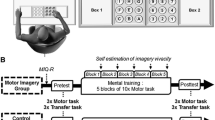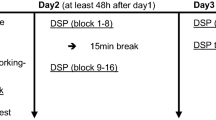Abstract
With physiological aging, appears a deterioration of the ability to retain motor skills newly acquired. In this study, we tested the beneficial role of motor imagery training to compensate this deterioration. We tested four groups: young control group (n = 10), elderly control group (n = 10), young mental-training group (n = 13) and elderly mental-training group (n = 13). In pre- and post-tests, the participants performed three trials on a dexterity manual task (the Nine Hole Peg Test), commonly used in clinic. We recorded the movement duration as a factor of performance. Each trial, including 36 arm movements, consisted in manipulating sticks as fast as possible. The control groups watched a non-emotional documentary for 30 min and the mental-training groups imagined the task (50 trials). First, we observed a speed improvement during the pre-test session for all groups. Immediately after viewing the movie (post-test 1), the young control group showed a preservation of motor performance in comparison to the performance measured before the break (pret-test 3), while the young mental-training group improved performance after motor imagery practice. For the elderly, the control group showed a deterioration of motor performance at post-test 1, attesting a deterioration of the ability to retain motor skills with aging. Interestingly, the elderly mental-training group showed a preservation of motor performance between the pre-test 3 and the post-test 1. The present findings demonstrate the beneficial role of mental training with motor imagery to retain the performance improvement following physical practice in the elderly. This method could be an alternative to prevent the deterioration of motor skills.



Similar content being viewed by others
References
Allman BL, Rice CL (2002) Neuromuscular fatigue and aging: central and peripheral factors. Muscle Nerve 25:785–796. https://doi.org/10.1002/mus.10116
Andrews-Hanna J, Snyder A, Vincent J, Lustig C (2007) Disruption of large-scale brain systems in advanced aging. Neuron 56:924–935. https://doi.org/10.1016/j.neuron.2007.10.038
Avanzino L, Gueugneau N, Bisio A et al (2015) Motor cortical plasticity induced by motor learning through mental practice. Front Behav Neurosci. https://doi.org/10.3389/fnbeh.2015.00105
Bartus RT, Dean RL, Beer B, Lippa AS (1982) The cholinergic hypothesis of geriatric memory dysfunction. Science 217:408–417. https://doi.org/10.1126/science.7046051
Bickford P (1993) Motor learning deficits in aged rats are correlated with loss of cerebellar noradrenergic function. Brain Res 620:133–138. https://doi.org/10.1016/0006-8993(93)90279-V
Bishop N, Lu T, Yankner B (2010) Neural mechanisms of ageing and cognitive decline. Nature 464:529–535
Classen J, Liepert J, Wise SP et al (1998) Rapid plasticity of human cortical movement representation induced by practice. J Neurophysiol 79:1117–1123. https://doi.org/10.1152/jn.1998.79.2.1117
Evans JG (1984) Prevention of age-associated loss of autonomy: epidemiological approaches. J Chron Dis 37:353–363. https://doi.org/10.1016/0021-9681(84)90101-2
Flöel A, Breitenstein C, Hummel F et al (2005) Dopaminergic influences on formation of a motor memory. Ann Neurol 58:121–130. https://doi.org/10.1002/ana.20536
Folstein MF, Folstein SE (1975) ‘Mini-Mental State’: a practical method for grading the cognitive state of patients for the clinician. J Psychiatr Res 12:189–198
Frank C, Land WM, Popp C, Schack T (2014) Mental representation and mental practice: experimental investigation on the functional links between motor memory and motor imagery. PLoS One 9(4):e95175. https://doi.org/10.1371/journal.pone.0095175
Galea J, Vazquez A, Pasricha N (2010) Dissociating the roles of the cerebellum and motor cortex during adaptive learning: the motor cortex retains what the cerebellum learns. Cereb Cortex 8:1761–1770. https://doi.org/10.1093/cercor/bhq246
Galganski ME, Fuglevand AJ, Enoka RM et al (1993) contractions muscle of elderly subjects during submaximal reduced control of motor output in a human hand. J Neurophysiol 69:2108–2115. https://doi.org/10.1152/jn.1993.69.6.2108
Gentili R, Papaxanthis C, Pozzo T (2006) Improvement and generalization of arm motor performance through motor imagery practice. Neuroscience 137:761–772. https://doi.org/10.1016/j.neuroscience.2005.10.013
Grosprêtre S, Lebon F, Papaxanthis C, Martin A (2016) New evidence of corticospinal network modulation induced by motor imagery. J Neurophysiol 115:1279–1288. https://doi.org/10.1152/jn.00952.2015
Hall CR, Martin KA (1997) Measuring movement imagery abilities: a revision of the Movement Imagery Questionnaire. J Ment Imag 21:143–154
Jackson PL, Lafleur MF, Malouin F et al (2001) Potential role of mental practice using motor imagery in neurologic rehabilitation. Arch Phys Med Rehabil 82:1133–1141. https://doi.org/10.1053/apmr.2001.24286
Jeannerod M (1994) The representing brain: neural correlates of motor intention and imagery. Behav Brain Sci 17:187. https://doi.org/10.1017/S0140525X00034026
Jiang C, Ranganathan V, Zhang J et al (2016) Motor effort training with low exercise intensity improves muscle strength and descending command in aging. Medicine 95:e3291. https://doi.org/10.1097/MD.0000000000003291
Jouvenceau A, Dutar P, Billard JM (1998) Alteration of NMDA receptor-mediated synaptic responses in CA1 area of the aged rat hippocampus: contribution of GABAergic and cholinergic deficits. Hippocampus 8:627–637. https://doi.org/10.1002/(SICI)1098-1063(1998)8:6%3C627::AID-HIPO5%3E3.0.CO;2-X
Lebon F, Guillot A, Collet C (2012) Increased muscle activation following motor imagery during the rehabilitation of the anterior cruciate ligament. Appl Psychophysiol Biofeedback 37:45–51. https://doi.org/10.1007/s10484-011-9175-9
Light LL (1991) Memory and aging: four hypotheses in search of data. Annu Rev Psychol 42:333–376. https://doi.org/10.1146/annurev.ps.42.020191.002001
Malone L, Bastian A (2016) Age-related forgetting in locomotor adaptation. Neurobiol Learn Mem 128:1–6. https://doi.org/10.1016/j.nlm.2015.11.003
Malouin F, Richards C, Jackson P (2007) The Kinesthetic and Visual Imagery Questionnaire (KVIQ) for assessing motor imagery in persons with physical disabilities: a reliability and construct validity study. J Neurol Phys Ther 31:20–29. https://doi.org/10.1097/01.NPT.0000260567.24122.64
Muellbacher W, Ziemann U, Wissel J et al (2002) Early consolidation in human primary motor cortex. Nature 415:640–644. https://doi.org/10.1038/nature712
Nitsche MA, Fricke K, Henschke U et al (2003) Pharmacological modulation of cortical excitability shifts induced by transcranial direct current stimulation in humans. J Physiol 553:293–301. https://doi.org/10.1113/jphysiol.2003.049916
Oishi K, Kasai T, Maeshima T (2000) Autonomic response specificity during motor imagery. J Physiol Anthropol 19:255–261. https://doi.org/10.2114/jpa.19.255
Rozand V, Lebon F, Stapley PJ et al (2016) A prolonged motor imagery session alter imagined and actual movement durations: Potential implications for neurorehabilitation. Behav Brain Res 297:67–75. https://doi.org/10.1016/j.bbr.2015.09.036
Ruffino C, Papaxanthis C, Lebon F (2017) Neural plasticity during motor learning with motor imagery practice. Rev Perspect 341:61–78. https://doi.org/10.1016/j.neuroscience.2016.11.023
Sawaki L, Yaseen Z, Kopylev L, Cohen LG (2003) Age-dependent changes in the ability to encode a novel elementary motor memory. Ann Neurol 53:521–524. https://doi.org/10.1002/ana.10529
Schott N, Munzert J (2007) Temporal accuracy of motor imagery in older women. Int J Sport Psychol 38:304–320
Seidler RD (2006) Differential effects of age on sequence learning and sensorimotor adaptation. Brain Res Bull 70:337–346. https://doi.org/10.1016/j.brainresbull.2006.06.008
Seidler RD (2007) Older adults can learn to learn new motor skills. Behav Brain Res 183:118–122. https://doi.org/10.1016/j.bbr.2007.05.024
Shea C, Park J, Braden HW (2006) Age-related effects in sequential motor learning. Phys Ther 86:478–488. https://doi.org/10.1093/ptj/86.4.478
Skoura X, Papaxanthis C, Vinter A, Pozzo T (2005) Mentally represented motor actions in normal aging: I. Age effects on the temporal features of overt and covert execution of actions. Behav Brain Res 165:229–239. https://doi.org/10.1016/j.bbr.2005.07.023
Smith CD, Umberger GH, Manning EL et al (1999) Critical decline in fine motor hand movements in human aging. Neurology 53:1458–1458. https://doi.org/10.1212/WNL.53.7.1458
Tamir R, Dickstein R, Huberman M (2007) Integration of motor imagery and physical practice in group treatment applied to subjects with Parkinson’s disease. Neurorehabil Neural 21:68–75. https://doi.org/10.1177/1545968306292608
Yue G, Cole KJ (1992) Strength increases from the motor program: comparison of training with maximal voluntary and imagined muscle contractions. J Neurophysiol 67:1114–1123. https://doi.org/10.1152/jn.1992.67.5.1114
Author information
Authors and Affiliations
Corresponding author
Additional information
Publisher’s Note
Springer Nature remains neutral with regard to jurisdictional claims in published maps and institutional affiliations.
Rights and permissions
About this article
Cite this article
Ruffino, C., Bourrelier, J., Papaxanthis, C. et al. The use of motor imagery training to retain the performance improvement following physical practice in the elderly. Exp Brain Res 237, 1375–1382 (2019). https://doi.org/10.1007/s00221-019-05514-1
Received:
Accepted:
Published:
Issue Date:
DOI: https://doi.org/10.1007/s00221-019-05514-1




